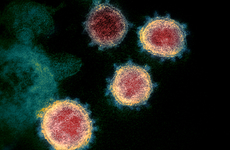
NEW YORK — An international team of researchers has identified 49 genetic variants linked to severe COVID-19, 16 of which have not been reported previously.
Critical COVID-19 is marked by the need among infected patients for continuous cardiorespiratory monitoring or organ support. Previous studies have shown that biological processes driven by patients' own immune systems contribute to severe COVID, leading researchers to study their genomic data to unearth genetic associations linked to disease severity and uncover targets for drug development.
"This [approach] really allows us to read the entire code that makes the immune system to give us clues about where [in] an immune system we might be able to target drug therapies to help people to get better," said corresponding author Kenneth Baillie, professor of experimental medicine at the University of Edinburgh.
For this study, published in Nature on Wednesday, Baillie and colleagues analyzed genomic data from 24,202 patients who were critically ill with COVID-19. They further performed a meta-analysis that combined the new data with previously published whole-genome sequencing data from critically ill COVID-19 patients from the international GenOMICC, SCOURGE, and the COVID-19 Human Genetics Initiative projects.
Of the 49 genome-wide significant associations identified, the researchers wanted to determine which could have therapeutic implications.
Since previous studies had shown that many of the genes involved in severe COVID-19 were highly expressed in the monocyte-macrophage system, the researchers constructed a new transcriptome-wide association study-based model in monocytes obtained from 176 individuals. They combined those results with protein expression data from Mendelian randomization studies to identify genes that have a causal role in the development of severe COVID.
These findings allowed them to identify 114 potentially druggable targets, including ones involved in inflammatory signaling like JAK1, in monocyte-macrophage activation and endothelial permeability like PDE4A, in immunometabolism like SLC2A5 and AK5, and in host factors required for viral entry and replication.
Baillie said he was most excited about the PDE4A finding, as it is a phosphodiesterase that regulates the production of multiple inflammatory cytokines by myeloid cells. While previous studies had shown negative correlations of its expression in lungs and blood, this study found that the genetic tendency for higher expression of PDE4A in monocytes is associated with critical COVID-19. "If you were to inhibit this gene in the monocytes, that might improve the condition of some patients," Baillie said.
He and his colleagues also noted that the link between critical COVID-19 and the gene that encodes JAK1, a protein involved in inflammatory signaling, as an important one. This gene is a target of the rheumatoid arthritis treatment baricitinib and offers a potential avenue for drug repositioning for severe COVID-19, they wrote.
They, however, cautioned that the findings from this study alone cannot identify which genes have causal effects on the course of disease progression.
"We think we understand some of the mechanisms by which these genes are acting, [but] it's very difficult to be sure without doing a lot of further research," Baillie said.
